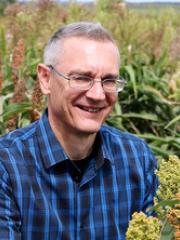Professor Andrew Borrell

Crop physiology and modelling at QAAFI
Crop physiology and modelling research at QAAFI involves developing crops that are resilient to different stresses like drought, heat and cold, through using genetic and management solutions. There are many combinations for genetic and management solutions for a particular environment; QAAFI tries to optimise for all of these combinations. Simulation modeling allows us to look at these different combinations and select the most favorable. The research team includes plant breeders, physiologists and molecular biologists, people bioinformatics, and robotics.
Researcher biography
Overview
Dr Borrell obtained bachelor and master’s degrees in Agricultural Science at The University of Melbourne, focusing on the Green Revolution genes (Rht1 and Rht2) in wheat for his thesis. He then completed a PhD at The University of Queensland on improving the efficiencies of nitrogen and water use for rice in the semi-arid tropics. Andrew was awarded a Churchill Fellowship to study the impact of rice research in Asia and the US on rice production in the Australian tropics. Much of his post-doctoral research has focused on improving drought adaptation in sorghum, rice, wheat and barley.
Dr Borrell is a crop physiologist and Centre Leader of the Queensland Government’s Hermitage Research Facility, a centre of excellence for crop improvement in water-limited environments. For more than a decade, Andrew has led an international project (Australia/US) aimed at discovering key genes underpinning the stay-green drought adaptation trait in cereals, using sorghum as a model crop. Prior to this, he conducted research to better understand the physiological basis of stay-green in sorghum. Dr Borrell began his career as a rice agronomist with the Queensland Government.
Dr Borrell co-leads projects in sub-Saharan Africa and India to develop drought-adapted sorghum germplasm. In addition to drought physiology in major cereals, Andrew has supervised a research program aimed at discovering frost adaptation in winter cereals at heading stage. He has also worked extensively in South-East Asia for the past 25 years developing sustainable cropping systems, including recent research on rice production and adaptation to climate change in Vietnam. Dr Borrell has served as Secretary-General of the Asian Crop Science Association.
